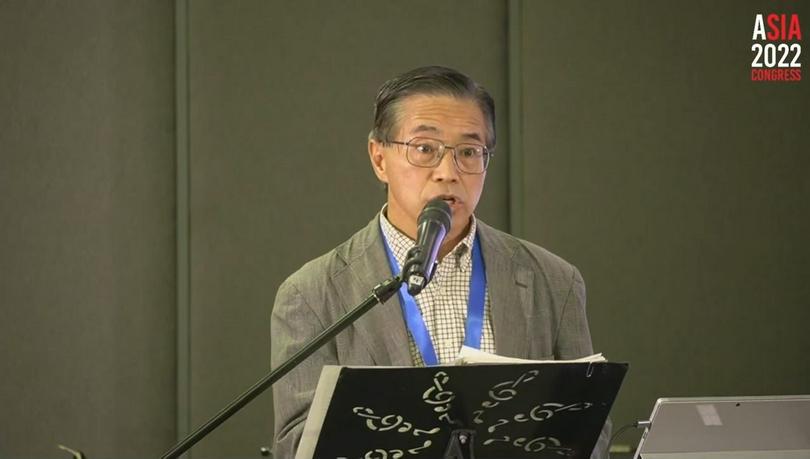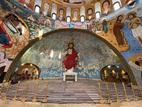A Japanese scholar put forward a new approach to preaching the gospel to Asians—witnessing—instead of following the historical ways of evangelism or social service.
In Plenary 6 of the Asia 2022 congress themed “Penetrating Asia's Cultural Heartlands with the Gospel”, Dr. Yoshiyuki Nishioka, research director at the Tokyo Mission Research Institute, contrasted the current two types of gospel transmission— propositional approach and social service approach, and presented the new approach, witnessing.
From October 17 to 21, the Asia 2022 Congress gathered about 600 Christian leaders from across Asia under the theme of "Rethinking Church and Mission: God’s Agenda for Today ", convened jointly by the Lausanne Movement in Asia, Asia Evangelical Alliance, and Asia Theological Association.
Addressing the participants from more than 40 countries on October 20, Dr. Yoshiyuki Nishioka first said that the propositional approach is the verbal proclamation of the gospel which is considered absolute universal truth. However, Nishioka stated four problems with this approach.
Firstly, this approach gives an illusion that there is a culture-free, pure gospel. But the fact is the gospel that brought by the incarnated Christ is deeply related to the very human reality that exists in the culture.
Secondly, the gospel expressed as a proposition is reductionist, and cultural superiority lurks under the reductionist conviction. “The enlightenment pursuit of objective and absolute knowledge distorts the understanding of the gospel and its presentation into excessive rationalism leads to evangelizing a sense of cultural superiority,” he said.
Thirdly, the worded gospel detached from people’s lives. The conceptualized gospel allows it to be separated from the communicator, being uninvolved in believers’ lives.
Fourthly, the conceptualized gospel and the gospel enveloped by foreign narratives may cause a discrepancy between the message that has been unconsciously transmitted and the words being spoken. Biblically correct words may no longer resonate in people's hearts.
Nishioka pointed out that the Lausanne Covenant issued in 1974 changed the course that evangelical churches only focused on preaching the correct gospel and neglected the response to social needs and affirmed evangelism and socio-political involvement are both parts of Christian duty.
But he observed that the church has become “a set of actualizing organizations, seeking quantitative growth and its maintenance”, and the social responsibility is fulfilled by the organizational group outside the church.
Nishioka described the social services Japanese churches do and the challenges they face. His own church sets a support group for mothers with infants who are easily isolated from society; provides a space for children to study or fellowship; give food assistance for children or needy families; etc.
Though churches respond to the needs of others, they cannot communicate the gospel directly to them, especially after tsunamis and earthquakes. So words conveyed through social actions are common to all humankind, like “we need to help each other in the time of distress”. Meanwhile, the invisible barriers between the help giver and the recipients can prevent the gospel from being shared. Even if they receive the gospel, they fail to grow in faith.
After contrasting the two approaches, Nishioka proposed a new approach—"witnessing".
He said, “The culture proclamation tends to be confrontational, even judgmental to the culture. Social service is more likely to be inceptive and sympathetic. The witness is presenting a new way of life while living in the culture, creating the new culture together.”
Nishioka explained the mechanism of the witness approach: the power of questions, rumors, and shared witnesses.
The propositional approach presents the gospel as an answer, but the communication of the witness raises questions in the recipient.
Rumors spread through the surprise of discovery of the recipient, and they are boiled up from within and spread from below, not from a force from above all, or pressure from outside. Nishioka named it as “an invisible force that moves people's hearts”.
Then the witness penetrates after the confusion of value.
“The living witness of believers raised certain questions among those who believe in other religions or secular gods, the question can never be meaningfully answered without the truth revealed in the light of the gospel of the cross and the resurrection of Christ,” he explained.
Nishioka clarified that the importance of the witness does not neglect the importance of the proclamation and social service, rather, the question raised by the witness draws people to the puppet table where the gospel is proclaimed and services given by people who love Jesus raise a great question among recipients.
“Word without deed and deed without word do not have a penetrating power. This is why the witness is crucial in which the word is not detached from the deed,” he concluded.












